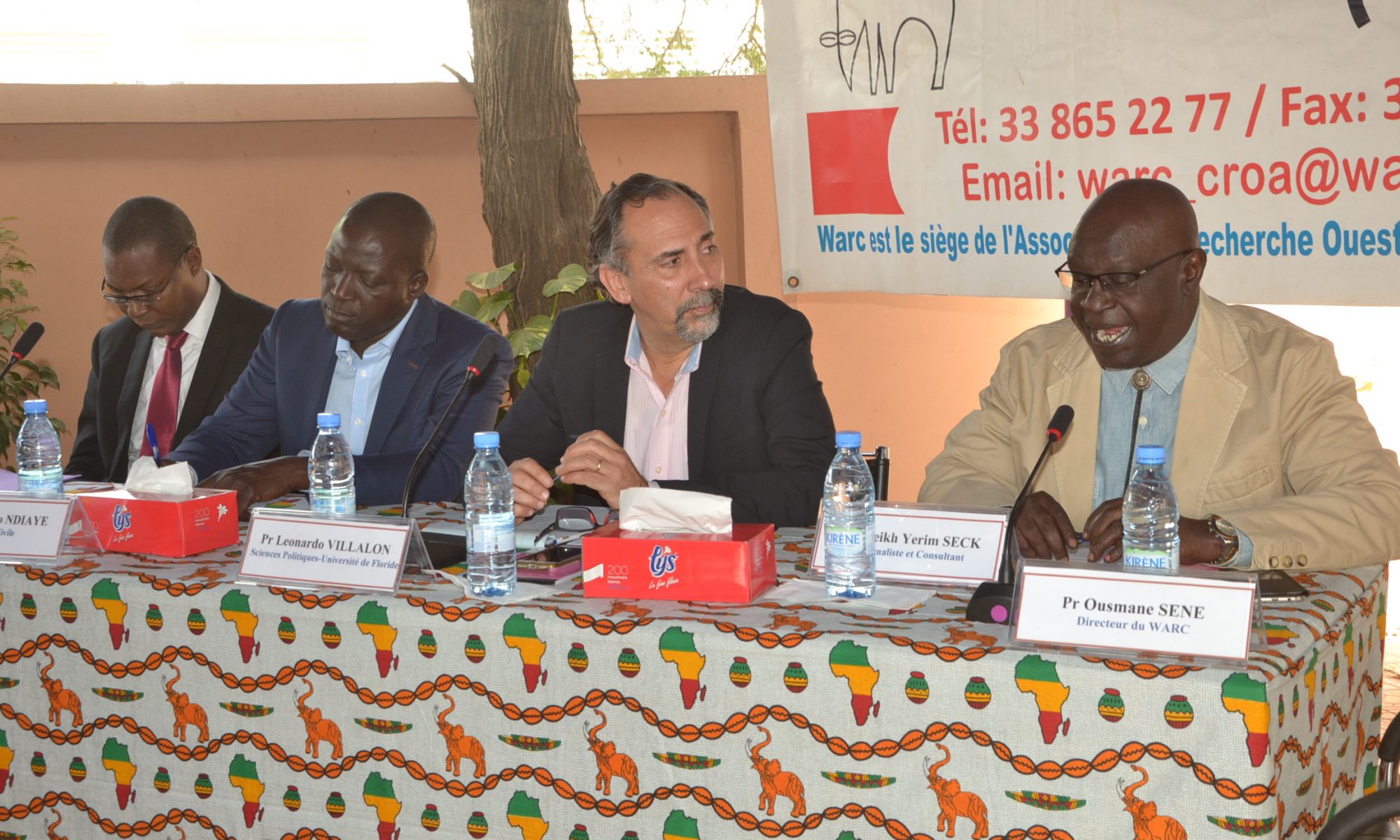Workshops and Conferences
Upcoming

Come and join us for a passionate discussion!
Colleagues from the Sahel Research Group and from the Center for African Studies will be organizing several panels and presenting their papers during the 2023 San Francisco 66th Annual meeting.
Excerpt from the program:
Thursday, November 30
Matthew Pflaum: Comparison of local socio-cultural livelihood vulnerabilities to insecurities in Malian communities
Sebastian Elischer: Reshaping the political arena? Informal elite pacts and the 2023 Nigerian general elections
Friday, December 1
Baba Adou, panelist and chair. Author meets critics panel: Invoking the invisible in the Sahara: Islam, spiritual mediation and Islam
Saturday, December 2
Zhu Tang: Islam, national identity, and politics in postcolonial Mauritania
Macodou Fall: Questioning sainthood in contemporary Senegal
Roundtable discussion with moderator (Date still to be confirmed) “Le coup de trop: Niger and the Sahel in the Balance”
Leonardo A. Villalón, UF; Ibrahim Yahaya Ibrahim, International Crisis Group; Sebastian Elischer, UF; Peter Sampson, United Nations Office for West Africa and the Sahel; Halimatou Hima, Cambridge University/Brookings Institute
Past events
 2nd Annual SRG/ICG Symposium on the Sahel
2nd Annual SRG/ICG Symposium on the Sahel
More than a decade after the March 2012 coup and government collapse in Mali, the Sahelian political landscape has been radically transformed, characterized by a new governance context that has been largely shaped by rising insecurity, military coups, and the failure of the French and multi-lateral regional stabilization efforts.
The presence of jihadist groups and their ability to durably seize territory have been constantly growing in the last decade, especially in the central Sahel. In addition, a series of military coups has recently struck the central Sahel as well as the wider West Africa region. This includes Mali (August 2020 and May 2021), Chad (April 2021), Guinea (September 2021), Burkina Faso (January 2022 and October 2022), and a failed coup attempt in Niger (March 2021). A new generation of military leaders is replacing the aging and largely discredited ruling elite. The French-led stabilization architecture in place since 2013 is also falling apart. Multilateral regional stabilization efforts are in a difficult situation. The G5 Sahel is at the end of its rope and struggles to remain relevant after Mali’s withdrawal.
This second ICG/SRG annual symposium addresses these issues. It brings together a number of scholars and practitioners in the policy community working on diverse aspects of the contemporary Sahel to present new research and exchange perspectives on the trajectory of the past decade and on prospects for the future.
This live event is free and open to the public (no virtual participation). Participants from outside the University of Florida are kindly requested to pre-register for the event by sending an email with your name and affiliation here. We gratefully acknowledge support for this event from the UF Center for African Studies and the Office of Research.
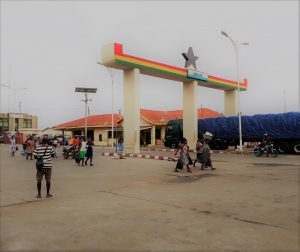 African Borderlands Research Network (ABORNE) Annual Meeting
African Borderlands Research Network (ABORNE) Annual Meeting
The UF Sahel Research Group and the OECD Sahel and West Africa Club will organize the 2020 African Borderlands Research Network (ABORNE) annual meeting in Paris from September 19-20th, 2022. The topic of the meeting is “Security and Trade in African Borderlands”. The conference will serve as a global forum for border scholars, local, regional and national policy makers and other border professionals from customs and security agencies, irrespective of their disciplinary backgrounds, methodological approaches, or geographical scope. Non-UF employees who wish to participate, please register here: sahelresearch@africa.ufl.edu
 Measuring and mapping border violence in North and West Africa: A policy perspective
Measuring and mapping border violence in North and West Africa: A policy perspective
This presentation will take place on April 19, 2022 at 8AM (EST) and look at why some border areas are more violent and the role that they play in the shifting instabilities that have affected North and West Africa for the last two decades. As conflicts and violent groups have become increasingly transnational, the panel will explore what types of policy responses could lead to a more durable peace. Moderators include Dr Ibrahim Assane Mayaki, Honorary President, Sahel and West Africa Club (SWAC) and Chief Executive Officer, African Union Development Agency (AUDA-NEPAD). Presentations by Laurent Bossard, Director, Sahel and West Africa Club Secretariat (SWAC/OECD); Dr Olivier J. Walther, Assistant Professor in Geography, Sahel Research Group, University of Florida and SWAC/OECD Consultant. Policy perspective panelists include Ms Emanuela Claudia Del Re, European Union Special Representative (EUSR) for the Sahel, and Ambassador Maman Sambo Sidikou, High Representative of the African Union Mission for Mali and the Sahel (MISAHEL).
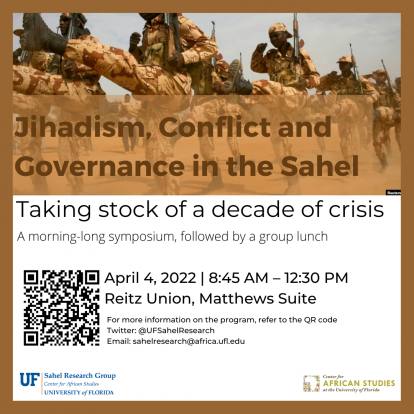 Jihadism, Conflict and Governance in the Sahel: Taking stock of a decade of crisis
Jihadism, Conflict and Governance in the Sahel: Taking stock of a decade of crisis
A decade after the March 2012 coup and the collapse of the Malian state, the Sahelian political landscape has been radically transformed, characterized by a new governance context that has been largely shaped by jihadism and conflict. This international symposium brings together a group of scholars with deep expertise, and currently working on diverse aspects of the contemporary Sahel, to present new research and exchange perspectives on the trajectory of the past decade, and on prospects for the future. Program. POSTER
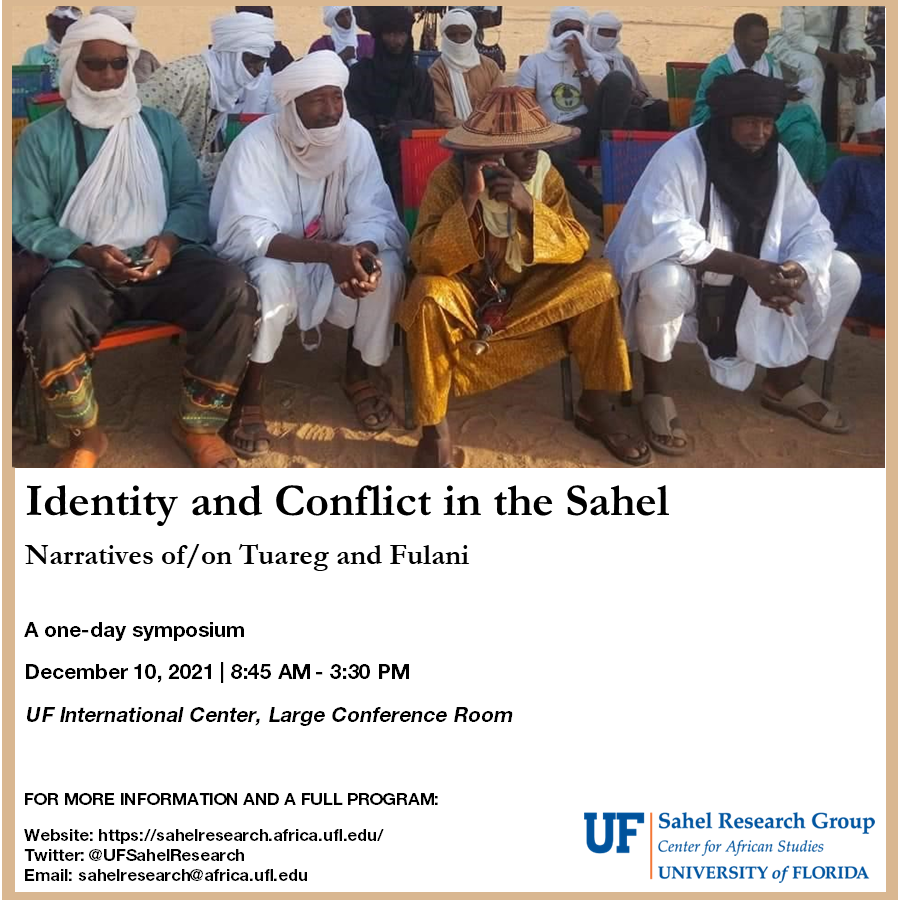 Identity and Conflict in the Sahel: Narratives of/on Tuareg and Fulani
Identity and Conflict in the Sahel: Narratives of/on Tuareg and Fulani
The symposium will bring together academic researchers of the Sahel for a critical dialogue around the evolving nature of imagined and constructed Sahelian ethnicities, with a specific focus on the Tuareg and Fulani communities. It aims to develop a reflexive agenda for the analysis of the discourses, representations and memories told by Sahelian elites, and to contextualize them through the multiple positionalities and interests of these elites and the different types of relations between Sahelian communities. The ongoing security and political crisis in the Sahel is now frequently framed as a Fulani or a Tuareg “question” or “problem,” placing ethnicity or ethnic belonging as a centrally important dimension for understanding conflictual dynamics across varied national contexts in the region. The symposium is motivated by the urgent need to examine the prevalence of discussions on Fulani and Tuareg communities as being at the center of current conflicts in the Sahel. The goal is to bring academic perspectives that go beyond simplistic ethnocentric narratives on the Fulani and Tuareg “questions” to the analysis of the ongoing “crisis” in the Sahel.
Follow the link for a full program. POSTER 1 POSTER 2
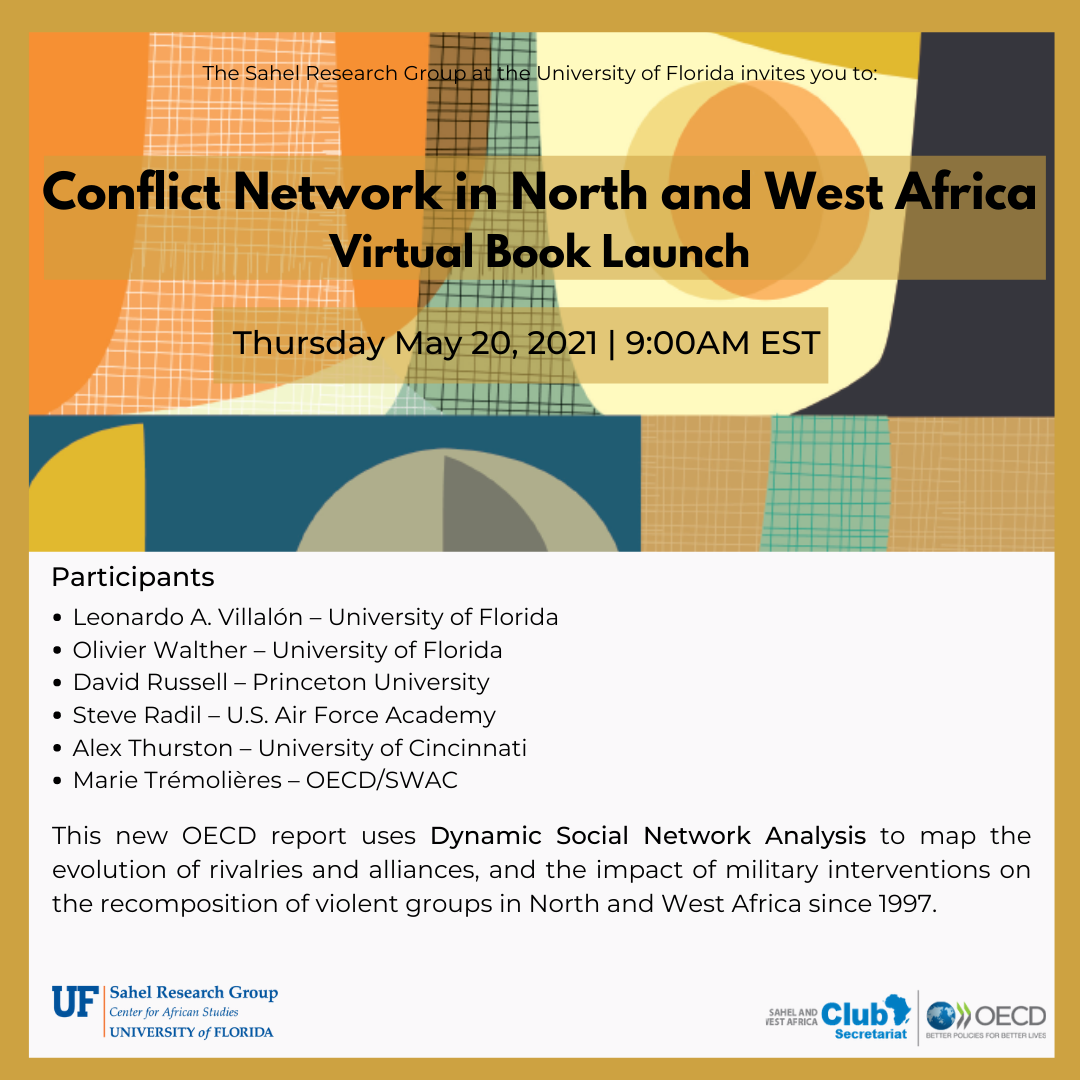 Conflict Networks in North and West Africa
Conflict Networks in North and West Africa
We are happy to announce the launch of the new SWAC/OECD report “Conflict Networks in North and West Africa” on May 20th at 9:00AM EST. Presentations by Leonardo A. Villalón, Olivier Walther (University of Florida), David Russell (Princeton University), Steve Radil (U.S. Air Force Academy), Alex Thurston (University of Cincinnati), Marie Trémolières (OECD)
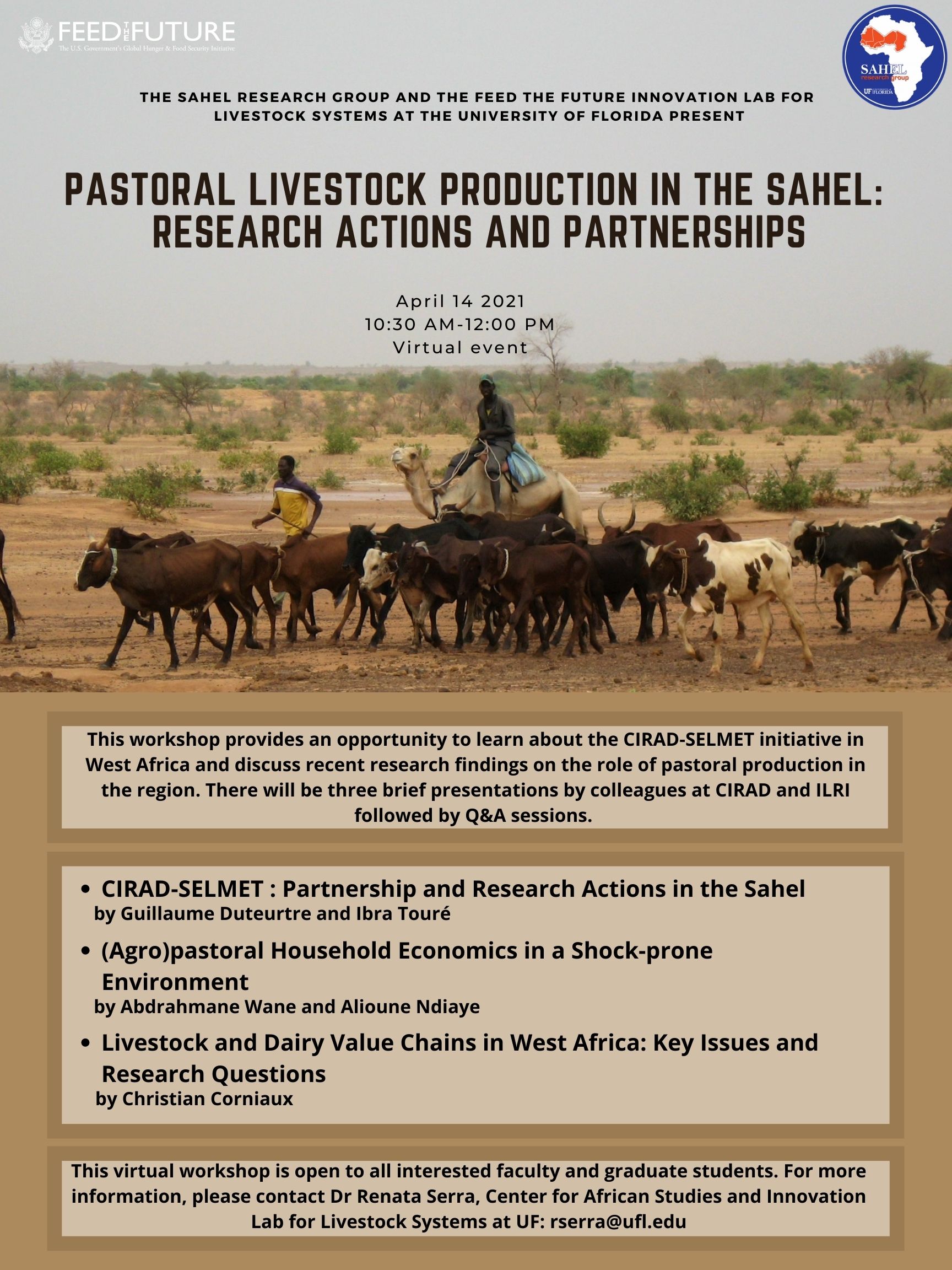 Pastoral Livestock Production in the Sahel: Research Actions and Partnerships
Pastoral Livestock Production in the Sahel: Research Actions and Partnerships
The Sahel Research Group jointly with the Innovation Lab for Livestock Systems at UF organized a workshop on: “Pastoral Livestock Production in the Sahel: Research Actions and Partnerships”. This virtual event took place on Wednesday April 14, 2021 at 10:30 AM (ET). Flyer Workshop summary
Presentations by Guillaume Duteurtre, Ibra Touré, Abdrahmane Wane, Alioune Ndiaye, and Christian Corniaux.
 Conference: Les enjeux de la laïcité: Regards croisés sur les débats Sahéliens
Conference: Les enjeux de la laïcité: Regards croisés sur les débats Sahéliens
The Sahel Research Group jointly with the West African Research Center (WARC) and Le Centre d’Etude des Religions (Université Gaston Berger) in Dakar organized a conference exploring the challenges of laïcité in the Sahel on Monday 8 July 2019 at 3:00 PM at the WARC in Dakar. Flyer
Our four guests were Rahmane Idrissa (Niger, Leiden University), Koudbi Kabore (Burkina Faso, University of Ouagadougou, Boukary Sangaré (Mali, University of Bamako) and Remadji Hoinathy (Chad, University of N’Djamena). The conference was moderated by Professor Leonardo Villalón (UF) and Professor Abdourahmane Seck (University Gaston Berger, Senegal)
 Roundtable on Secularism in the Sahel
Roundtable on Secularism in the Sahel
With Leonardo Villalón (UF), Abdourahmane Idrissa (Niger, Leiden U), Koudbi Desiré Kaboré (Burkina Faso, Ouagadougou U), Hoinathy Remadji (Chad, CRASH), Boukary Sangaré (Mali, Leiden U), Abdourahmane Seck (Senegal, U Gaston Berger Saint Louis). This event is part of the Symposium “Lived Islam in Africa” organized by the UF Center for African Studies, Center for Global Islamic Studies and Department of Religion from May 22-24.
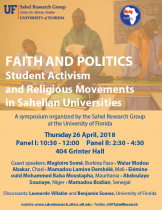 Faith and Politics: Student activism and religious movements in Sahelian universities
Faith and Politics: Student activism and religious movements in Sahelian universities
On Thursday and Friday 26 and 27 April, 2018, the Sahel Research Group (SRG) hosted a symposium and workshop on “Faith and Politics: Student Activism and Religious Movements in Sahelian Universities,” at the Center for African Studies, University of Florida.
This event brought together scholars from six countries of the Sahel with colleagues from the University of Florida. Presenters included Mamadou Bodian from Senegal, Abdoulaye Sounaye from Niger, Elémine ould Mohamed Baba Moustapha from Mauritania, Mamadou Dembélé from Mali, Magloire Somé from Burkina Faso, and Abakar Walar Modou from Chad. Collectively the presentations offered an in-depth and comparative analysis of religious student movements across the campuses of national universities in all six countries.
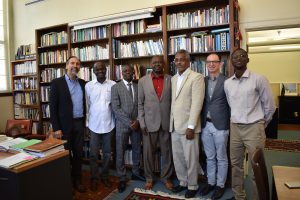 The Sahel region has experienced significant recent socio-political change. Religiously-based student movements, largely but not exclusively Muslim, are now central features of student life across the region. These have overshadowed what remained of the older leftist student movements of the first post-independence decades, as well as the more recent corporatist movements represented by student unions demanding material benefits. The symposium, supported by a grant from the Minerva Initiative, was structured to allow for comparative examination of the individual country cases so as to shed light on the factors influencing these changes as well as the reasons for the increasing religiosity on university campuses in Sahelian countries. The symposium will provide the basis of a forthcoming publication. Read the Program
The Sahel region has experienced significant recent socio-political change. Religiously-based student movements, largely but not exclusively Muslim, are now central features of student life across the region. These have overshadowed what remained of the older leftist student movements of the first post-independence decades, as well as the more recent corporatist movements represented by student unions demanding material benefits. The symposium, supported by a grant from the Minerva Initiative, was structured to allow for comparative examination of the individual country cases so as to shed light on the factors influencing these changes as well as the reasons for the increasing religiosity on university campuses in Sahelian countries. The symposium will provide the basis of a forthcoming publication. Read the Program
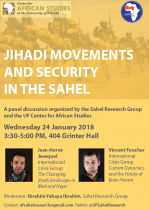 Roundtable: Jihadi movements and security in the Sahel
Roundtable: Jihadi movements and security in the Sahel
The Sahel Research Group and Center for African Studies are proud to present a discussion on Jihadi movements in the Sahel on Wednesday 24 January 2018 from 3:30-5:00 PM in 404 Grinter Hall.
Our two guests will be Jean-Hervé Jezequel and Vincent Foucher from the International Crisis Group. Jean-Hervé Jezequel will lecture on the changing jihadi landscape in Mali and Niger. Vincent Foucher will address the current dynamics and the future of Boko Haram. The talk will be moderated by Ibrahim Yahaya Ibrahim of the Sahel Research Group. Download our poster.
Conference: On the Edge: What Future for the African Sahel?
The Sahelian region of West Africa is at an important crossroads, under multiple pressures of diverse kinds—environmental, political, demographic, security, and economic—and marked by rapidly changing social and cultural dynamics. This interdisciplinary conference will bring together scholars from Africa, Europe, and North America to other perspectives on key issues shaping the region. The conference will take place from February 23 to February 25, 2017. It is
Symposium: African Clandestine Migrants and Fortress Europe
The Sahel Research Group is co-sponsor of the symposium “African Clandestine Migrants and Fortress Europe: Dreams of a Better Future and Human Dramas in the Mediterranean Sea.” Held on 22-23 January 2016, this symposium explored the flow of migration from Africa to Europe, examining underlining factors, consequences, and likely future scenarios on this risky migration route. Click on the links below for more information. Poster
Workshop: L’Islam au Sahel: nouvelles tendances et dynamiques locales
In collaboration with the Centre d’Etudes des Religions of the Université Gaston Berger (UGB) in St. Louis, Senegal, the Sahel Research Group has organized an International Workshop on the theme of L’Islam au Sahel: nouvelles tendances et dynamiques locales. Held at the UGB on 27-28 June 2014, this workshop served as an initial exchange of ideas and a platform on which to build a collaborative program of research on religious dynamics across the Sahel. Program
Talk: Islam, Slavery, and Human Rights in Mauritania
A presentation by Biram ould Dah ould Abeid, a major Mauritanian anti-slavery activist and winner of the 2013 UN Human Rights Award. Biram ould Dah ould Abeid is a candidate in Mauritania’s June 2014 presidential election. If you would like to learn more about his campaign please see his campaign videos below. Poster Video 1Video 2
Roundtable: The Maghreb after the Arab Spring: Tunisia and Algeria in Regional Perspective
This panel discussion focused on the contrasting political trajectories of these countries of the Magbreb since the events of the “Arab Spring,” and their implications for the Sahel. Poster
Conference: The Politics of Institutional Reform in Sahelian Africa
This conference and workshop, sponsored by the Minerva Initiative grant to the Sahel Research Group, brought together distinguished scholars from the Sahel at the University of Florida. Discussions focused on the key question of whether the politics of creating and reforming institutions in the name of democracy have weakened or strengthened states across the region. Read More
Roundtable: Making Sense of the Sahelian Crisis: One year after Qaddafi
On the one year anniversary of the fall of Qaddafi in Libya, this public panel sponsored by the Sahel Research group provided a forum for discussing the array of actors, issues and forces that led to the collapse of Mali and which were central in shaping the evolution of the Sahelian crisis. Poster
APSA Africa Workshop: Religion and Politics in Comparative Perspective
Leonardo Villalón and Kenneth Wald served as the two US-based workshop leaders for the 2013 American Political Science Association’s Africa workshop in Burkina Faso. The team also included Professors Augustin Loada (Burkina Faso), Mahaman Tidjani-Alou (Niger) and Dr. Einas Ahmed (Sudan). On the theme of “Religion and Politics in Comparative Perspective,” the two-week workshop was held in collaboration with the Center for Democratic Governance. The program brought together 22 young African scholars, from 17 countries, as well as five US and European based scholars, for intensive training and discussion on carrying out research on the issue of religion and politics in Africa.
Symposium: “Demography and the Challenge of Social Change in the African Sahel”
The symposium was part of a year-long project on the theme of Development, Security and Climate Change in the Sahel, which involves exchange and collaboration between UF, Sciences Po (France) and Université Cheikh Anta Diop (UCAD- Dakar, Senegal). Five graduate students visited UF between Sept. 20-26 thanks to funding from the US French Embassy through the France-Florida Research Institute. The symposium was followed by a series of workshops hosted by the Center for African Studies. Schedule of workshops. Poster, Pictures 1, Pictures 2,
